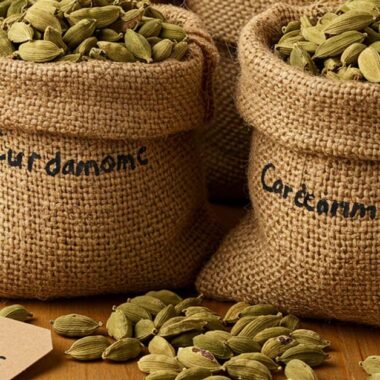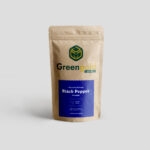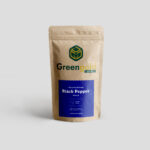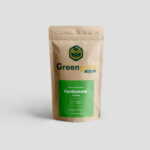Organic cardamom farming is becoming increasingly popular as farmers and consumers recognize its health, environmental, and economic advantages. Unlike conventional methods, organic cultivation relies on natural fertilizers, biological pest control, and sustainable farming practices, ensuring a high-quality, chemical-free spice. 🌏
Here’s why switching to organic cardamom farming is a game-changer! 🚜🌱
✅ 1. Higher Market Demand & Premium Pricing 💰
Consumers today prefer organic, chemical-free food, making organic cardamom a premium product in both domestic and international markets.
📈 Benefits:
✔️ Higher prices than conventional cardamom
✔️ Strong demand in markets like the USA, Europe, and the Middle East
✔️ Easier to sell in specialty organic stores & online platforms
💡 Tip: Certified organic cardamom fetches 20-50% higher prices than non-organic varieties! 📦
🌍 2. Environmentally Friendly & Sustainable Farming
Organic farming helps maintain a healthy ecosystem by eliminating harmful chemicals.
🌱 Eco-friendly advantages:
✔️ No synthetic pesticides or chemical fertilizers
✔️ Improves soil fertility with compost & green manure
✔️ Reduces water pollution from pesticide runoff
✔️ Promotes biodiversity, supporting beneficial insects & birds 🐦
💡 Tip: Planting shade trees & companion crops enhances sustainability and prevents soil erosion! 🌾
🏆 3. Better Soil Health & Long-Term Productivity
Chemical farming depletes soil nutrients over time, whereas organic farming improves soil structure & fertility naturally.
🌱 Soil health benefits:
✔️ Natural compost & manure boost microbial activity
✔️ Mulching & cover crops prevent soil erosion
✔️ Crop rotation enhances nutrient balance
💡 Tip: Using vermicompost & biofertilizers enhances soil fertility for higher long-term yields! 🌿🐛
🚫 4. No Harmful Chemicals = Healthier Cardamom
Organic cardamom is 100% chemical-free, making it safer for consumers and healthier for farmers.
⚠️ Risks of chemical farming:
❌ Chemical pesticides leave toxic residues on spices
❌ Synthetic fertilizers can cause soil & water contamination
❌ Long-term pesticide exposure affects farmer health
✅ Organic solution:
✔️ Natural pest control (neem oil, beneficial insects)
✔️ Biofertilizers (cow dung, compost, green manure)
✔️ Chemical-free drying & processing ensures purity
💡 Tip: Organic cardamom is ideal for medicinal use due to its pure, untainted quality! 🍃
🐜 5. Natural Pest & Disease Control
Organic farmers use eco-friendly pest management rather than synthetic insecticides.
🔬 Effective organic pest control methods:
✔️ Neem oil & garlic sprays repel pests 🦗
✔️ Trichoderma & Beauveria bassiana combat fungal diseases 🍄
✔️ Companion planting (marigold, lemongrass) deters harmful insects
💡 Tip: Using pheromone traps & light traps reduces pest infestation without chemicals! 🏮
🌦️ 6. Resilient to Climate Change
Organic farming techniques help plants adapt to extreme weather conditions like droughts and heavy rains.
🌱 Climate benefits of organic farming:
✔️ Mulching conserves moisture & prevents soil erosion
✔️ Organic manure improves water retention in soil
✔️ Crop diversity & agroforestry reduce climate risks
💡 Tip: Practicing water harvesting & drip irrigation can further enhance drought resistance! 💧
🌱 7. Improves Farmer Health & Livelihoods
Farmers who switch to organic cultivation reduce their exposure to toxic chemicals and enjoy better health.
👨🌾 Farmer benefits:
✔️ Lower input costs (no expensive synthetic fertilizers/pesticides)
✔️ Healthier work environment (no harmful chemical exposure)
✔️ Better soil management = sustainable income for future generations
💡 Tip: Organic certification programs offer subsidies & training to help small farmers transition! 📜
🌍 8. Helps in Organic Certification & Global Trade
Going organic makes it easier to get certified and enter international markets.
🏆 Top organic certifications:
✔️ NPOP (India) – National Programme for Organic Production
✔️ USDA Organic (USA) – Required for US markets
✔️ EU Organic (Europe) – Compliance with European organic standards
✔️ JAS (Japan) – For exporting to Japan
💡 Tip: Certified organic farms can export to premium buyers globally for better profits! 🌏📦
🔄 9. Encourages Biodiversity & Agroforestry
Organic farms support natural ecosystems, attracting beneficial birds, bees, and insects.
🌳 Agroforestry benefits:
✔️ Growing shade trees protects cardamom plants 🌴
✔️ Bees & butterflies help pollination, improving yields 🐝
✔️ Diverse flora & fauna create a balanced environment
💡 Tip: Intercropping banana, pepper, or coffee alongside cardamom increases biodiversity & income! 🍌☕
🛒 10. Consumer Trust & Brand Value
Organic certification boosts consumer confidence, making your cardamom stand out in a competitive market.
💚 Why customers love organic cardamom:
✔️ 100% natural & chemical-free 🌿
✔️ Better flavor & aroma for cooking and herbal use 🍵
✔️ Supports ethical & sustainable farming 🌎
💡 Tip: Promote your organic cardamom with a certified organic label & eco-friendly packaging! 🏷️♻️
🎯 Final Thoughts: Why Go Organic?
Switching to organic cardamom farming is a smart investment for both farmers and the planet. From higher prices to better soil health, the long-term benefits make it a sustainable & profitable choice! 🌱💰
🔹 Higher market value & export potential
🔹 Eco-friendly & chemical-free 🌿
🔹 Healthier for consumers & farmers
🔹 Supports biodiversity & soil fertility
💡 Thinking of switching to organic cardamom? Need help with certification? Let’s discuss below! 👇💬
🛒 Buy 100% Organic Cardamom
Looking for the best organic, pesticide-free cardamom? Visit:












